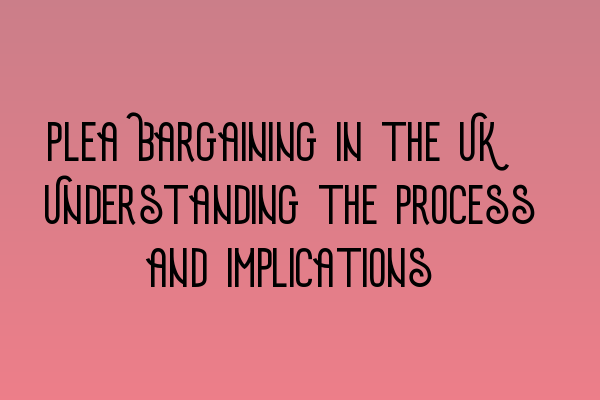Plea Bargaining in the UK: Understanding the Process and Implications
Plea bargaining is a crucial aspect of criminal law in the UK, allowing defendants to negotiate a plea deal with the prosecution in exchange for a reduced sentence or lesser charges. This process can significantly impact the outcome of a criminal case, making it important for defendants, solicitors, and legal professionals to understand its intricacies.
At SQE Criminal Law & Practice Law UK, we offer comprehensive guidance on plea bargaining to help solicitors and aspiring legal professionals navigate this complex area of law. In this article, we will delve into the process of plea bargaining in the UK and explore its implications for defendants.
The Process of Plea Bargaining
In the United Kingdom, plea bargaining primarily occurs during the pre-trial phase, allowing the defendant to negotiate with the prosecution before the case proceeds to court. This process involves discussions and negotiations between the defendant’s solicitor and the prosecution, aiming to reach an agreement that is mutually beneficial.
During plea bargaining, the defendant usually has two options:
- Charge Bargaining: This refers to the defendant negotiating a plea deal that involves pleading guilty to a lesser charge or a reduced number of charges. For example, an individual accused of robbery might negotiate a plea to a lesser charge of theft.
- Sentence Bargaining: In this scenario, the defendant negotiates a plea deal that involves pleading guilty to the original charge but with a reduced sentence. The prosecution may agree to recommend a more lenient sentence in exchange for the defendant’s guilty plea.
Plea bargaining is a delicate process that requires the expertise of a skilled solicitor who can effectively negotiate on behalf of the defendant. It is crucial for defendants to seek legal representation from experienced solicitors who specialize in criminal law to ensure the best possible outcome.
The Implications of Plea Bargaining
Plea bargaining can have significant implications for defendants. By negotiating a plea deal, defendants may be able to avoid the uncertainty and potential risks associated with a trial. This can result in reduced penalties, saving defendants from potential lengthy prison sentences or excessive fines.
However, it is important for defendants to fully understand the implications of pleading guilty to a lesser charge or accepting a reduced sentence. While plea bargains can offer advantages, defendants must consider the long-term effects on their criminal records and future prospects.
At SQE Criminal Law & Practice Law UK, we provide comprehensive education and resources to help solicitors and legal professionals navigate the complexities of plea bargaining. Our SQE 1 preparation courses and SQE 2 preparation courses equip aspiring solicitors with the knowledge and skills necessary to succeed in the field of criminal law.
Moreover, it is crucial for solicitors and legal professionals to stay updated with the latest SRA SQE exam dates to ensure timely preparation for the SQE exams.
In conclusion, plea bargaining plays a vital role in the UK criminal justice system, offering defendants the opportunity to negotiate a plea deal and potentially achieve more favorable outcomes. Understanding the process and implications of plea bargaining is essential for solicitors and legal professionals to effectively represent their clients. At SQE Criminal Law & Practice Law UK, we are dedicated to providing the necessary resources and preparation courses to help aspiring solicitors excel in criminal law.
For more information on plea bargaining and other relevant legal topics, explore our related articles:
- SQE 1 Practice Exam Questions
- SQE 1 Practice Mocks FLK1 FLK2
- SQE 2 Preparation Courses
- SQE 1 Preparation Courses
- SRA SQE Exam Dates
